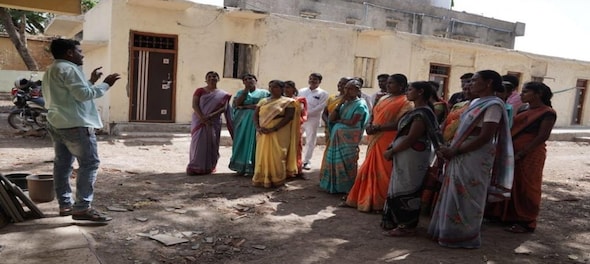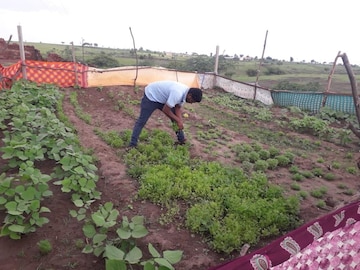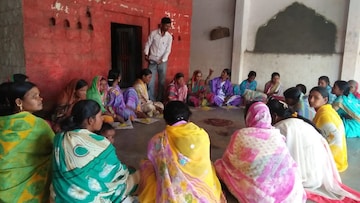
For several years, summers were parched in Panvan village, Maan block of Satara, Maharashtra. Despite having decent rainfall during monsoons, Panvan village was among the several villages in Satara that were drought-prone.
But this summer is different.
It's a summer that 25-year-old Sandeep Kharat would love to cherish. He hopes summers are like this for the rest of his life. "Since I was born I had never seen anyone swim in the summer months,” he said. But now it's different in his village.
His village is among six villages that were part of an initiative carried on by CORO and 24 local organisations in Satara to solve the water problem in the region. While this project is expected to directly improve the water level in six villages, indirectly it will support 32 villages.
Why Water Became Women’s Problem
During summers, water tankers became a regular in the region, followed by bickering and even massive fights that erupted among women due to water shortage. Vaishali Rayate, who resides in Kadoli village and team member of CORO, said, "Managing water usually becomes the responsibility of the woman in the family. Women were suffering in more ways than one due to this. Other than water requirements for daily chores, the need for clean water during menstruation is a challenge. Most women depend on cloth during menstruation and not being able to get access to clean water and enough water to wash this piece of cloth (properly) can lead to many health issues among women."
Right to Pee activist Supriya Jan, who is handling the initiative for CORO, said, "Water and women are intertwined. Women become passive victims. This is why women came forward in Satara."

From 10 talukas in Satara, 90 women took a leadership role and implemented an approach facilitated by CORO: Water School (Paani Shala) and Gram Kosh. Water School trained the volunteers in the village within the community to resolve the issues of water scarcity with scientific information to assist with water conversation methods. Gram Kosh was about developing a corpse of Rs 1 lakh to sustain the project in the future, which is run by the respective village committee.
Health issues, lack of education, marriage at an early age, etc. among girls were causes of concern. This prompted women to break gender, caste, and other cultural barriers; and take a step to change, stated Jan. “This water project in Satara, slowly and gradually, enabled women to overcome some stereotypes existing in society."
Jan added the initiative in Satara empowered women and helped not-for-profit organisations to eliminate gender and caste biases – all this due to water.
Running Water Cooperative
CORO and 24 local organisations realised that the villages would succeed in their mission only through a water cooperative strategy – all collaborate and work together. This intervention facilitated a community-led approach that helped villages to get together to petition the local government for funds. The government sanctioned around Rs 1.44 crore for this work.
It takes years for water replenishment projects to be successful. The work started around 2019 in the six focused villages (even though work on some nearby villages started in 2011). “We had to hold the work for some time during COVID in 2020. But the project did survive due to the scientific approach and the proactive attitude of the community. This approach will have to continue to maintain healthy water levels in the future.” The community keeps a close watch on technical inputs about groundwater, bunding, well mapping, etc.

The cropping pattern in the region had to change as well. “Farmers in the region readily accepted the change as they realised how the change in cropping behaviour can help tackle water shortage and support their livelihood.” In addition, women were informed about optimum use and reuse of water like growing kitchen gardens with used water, etc.
Jan explained, "For the project to run successfully, the village or the community has to ensure that the scientific processes are maintained even after CORO leaves the village. Our role is to train, enable and pass the scientific process to the community. So, they lead it as CORO cannot be present everywhere."
After Water School and Gram Kosh...
Today, the water level in six villages has risen by 14-15 feet, claimed CORO, and four of them don't require tankers at all. Jan added, "Our aim was to make the villages free from tankers. Even when we raise funds from donors, we tell them our approach is to make villages tanker free."
Maharashtra has been reeling under water shortage for decades. In 2019, around 21,000 villages across the state were hit by drought. This was mainly attributed to scanty rainfall and a drastic drop in groundwater levels.
The CORO team along with others will be holding talks with the state and local authorities to replicate the model in other villages in the state too. "Next week, we will meet the collector of Sangli, Satara, and Kolhapur. So that the existing model can be replicated."
(Edited by : Jomy Jos Pullokaran)
First Published: Apr 12, 2022 11:10 PM IST
Check out our in-depth Market Coverage, Business News & get real-time Stock Market Updates on CNBC-TV18. Also, Watch our channels CNBC-TV18, CNBC Awaaz and CNBC Bajar Live on-the-go!


Prajwal Revanna's father in custody for alleged kidnapping and sexual abuse
May 4, 2024 7:53 PM
Delhi, Indore, Surat and Banswara — why these are the most challenging domains for Congress internally
May 4, 2024 1:53 PM
Congress nominee from Puri Lok Sabha seat withdraws, citing no funds from party
May 4, 2024 12:00 PM
Lok Sabha Polls '24 | Rahul Gandhi in Rae Bareli, why not Amethi
May 4, 2024 9:43 AM

